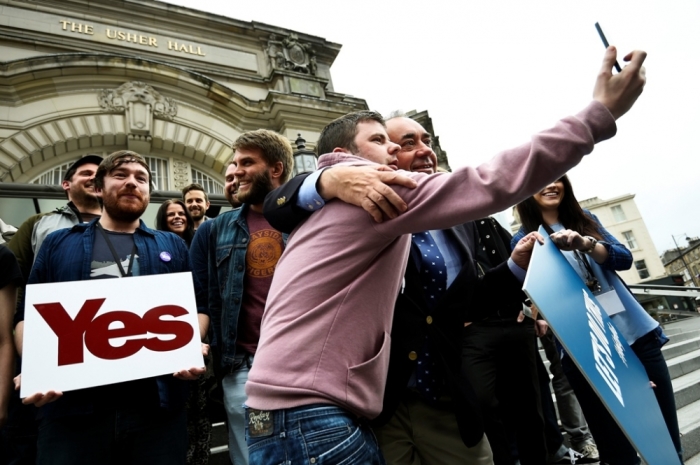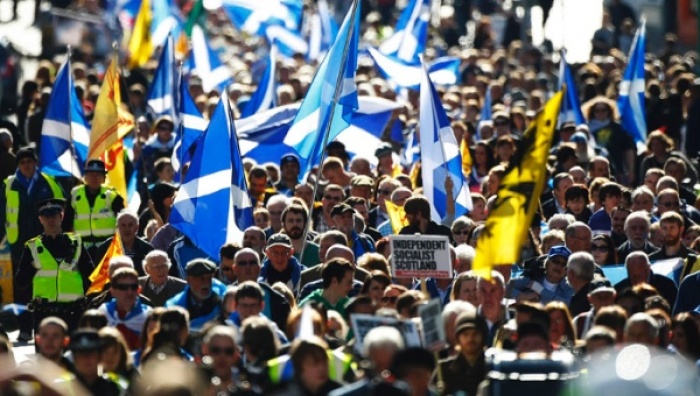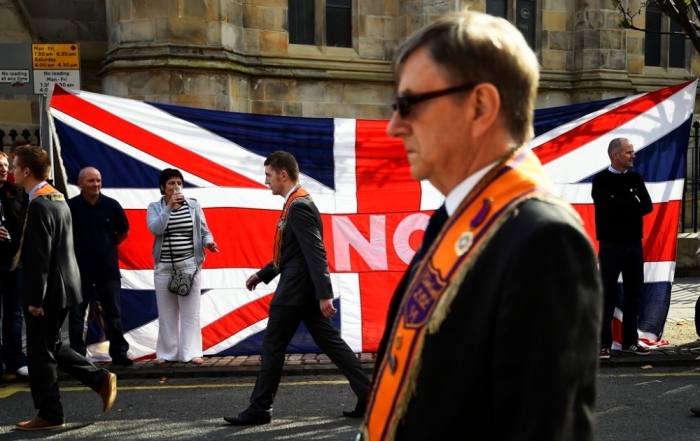Church of Scotland Focuses on Reconciliation as Nation Prepares to Vote on Independence From UK

The Church of Scotland has said it's aiming for reconciliation and to bring the country together regardless of the results of the all-important referendum on Thursday that will decide whether Scotland will separate from the United Kingdom or not.
A representative of the Church confirmed the Church's neutrality on the referendum in an email to The Christian Post late last week. He also offered several statements from Rt. Rev. John Chalmers, the moderator of the General Assembly, who addressed Scottish believers in a sermon from St. Mary's Episcopal Cathedral in Edinburgh on Sunday.
"There are all sorts of difficult life choices and these should be subject of our prayers, just as my wrestling with the 'Yes/No question' for Scotland will be the subject of my prayers," Chalmers stated.
"And all of those who will vote YES and all of those who will vote NO need to remember that we belong together in the same Scotland. We cannot be separated, even though on Thursday we may be on opposite sides, we belong together. We should not let ourselves be defined by which side we are on, on Sept. 18. When we wake up on the 19th of September, we need to be ready to work on the same side — to work for the future of Scotland and work with our near neighbors in England, Wales and Northern Ireland — whatever outcome."

With only days to go before the vote, various polls have presented different results on which side is in the lead, but most agree that the referendum remains too close to call.
Both those in favor of Scotland becoming an independent country and those who wish that it remains part of the U.K. have campaigned strongly for their cause, with discussion and debate increasing over the past year and especially over the last several months.
In an article last week, BBC News broke down the specifics behind the Yes/No vote, which will answer a single question: "Should Scotland be an independent country?"
The driving force behind the Yes vote is the Scottish government led by First Minister Alex Salmond, who has said that Scotland has an abundance of oil wealth so it can exist independently on its own, and it wishes to be free from the "shackles" of an English-based U.K. parliament.
British Prime Minister David Cameron has strongly disagreed with the proposed move, and argued that the U.K., which is comprised of England, Wales, Scotland and Northern Ireland, is stronger when united and provides important benefits to all of its territories.
An important question remains whether an independent Scotland will also stay in the European Union, which Britain is a member of, or if it will have to start a new application and wait several years to rejoin.
Christians in Scotland, which according to a 2011 Scotland Census make up 54 percent of the population, have also expressed different views of the matter.
While the largest denomination, The Church of Scotland, maintains its neutrality on the subject, more than 30 of its ministers have signed a declaration in support of Scottish independence.
"Sept. 18 is a once-in-a-lifetime opportunity to remove the worst thing in Scotland," the Rt. Rev. Andrew McLellan said about the possible "Yes" vote, which he says would allow the country to get rid of its nuclear weapons.
"Speaking against nuclear weapons is good, campaigning against nuclear weapons is good, and praying for their abolition is good," he added. "But what will change everything is voting 'Yes' in the referendum."

The Rev. Ewan Aitken, chief executive of the Edinburgh charity the Cyrenians, has been one of the most prominent speakers defending Scotland's place in the U.K., and has pointed out that independence would create new problems.
"I agree with the Church of Scotland that Trident is evil and must go, but voting 'Yes' will simply mean we are dumping it on our own neighbors," Aitken said on the topic of Britain's nuclear weapons program.
"This would not be a great start to nation-building."
Pope Francis, the leader of the Roman Catholic Church, which is the second largest Christian Body in Scotland, has also voiced his thoughts.
Francis said back in June: "The independences of nations by secession is a dismemberment, sometimes it's very obvious. Let's think of the former Yugoslavia. Obviously, there are nations with cultures so different they couldn't even be stuck together with glue.
"The Yugoslavian case is very clear, but I ask myself if it is so clear in other cases — Scotland, Padania, Catalunya," he continued.
"There will be cases that will be just and cases that will not be just, but the secession of a nation without an antecedent of mandatory unity, one has to take it with a lot of grains of salt and analyze it case by case."
Representatives of both sides of the issue in Scotland welcomed the pontiff's comments.
A spokesman for the pro-independence Yes Scotland campaign said: "As his holiness says, these matters should be looked at on a case-by-case basis. Scotland's national status has always been recognized by the Catholic Church. Indeed, Scotland has been a filia specialis, or favorite daughter, of the papacy."
The pro-U.K. Better Together campaign said that "the pope is right to warn about the impact of division on society and to draw the distinction between independence for emancipation and that for secession."
Spokeswoman Anne McGuire said: "We live in a large interdependent world and the best way to secure our future is to work together as part of something bigger."
In his sermon on Sunday, Chalmers argued that a good thing that has resulted from the upcoming referendum is that it has encouraged almost the entire nation to take part in the discussion.
"And the real success of next Thursday will be that, whatever the outcome, every voice and every instrument continues to play its part in shaping the kind of Scotland that people in Scotland vote for. We cannot afford to lose the momentum and interest in Scottish civic life, which this campaign has generated," Chalmers added.
"But back to the beginning, I think the reason that some of us hover on the fence for as long as we do is that we fear for the future and we fear that we might make the wrong choice. But if we know that we will be part of shaping that future, always guided by love, we have much less to fear even if the outcome is not our choice."



























